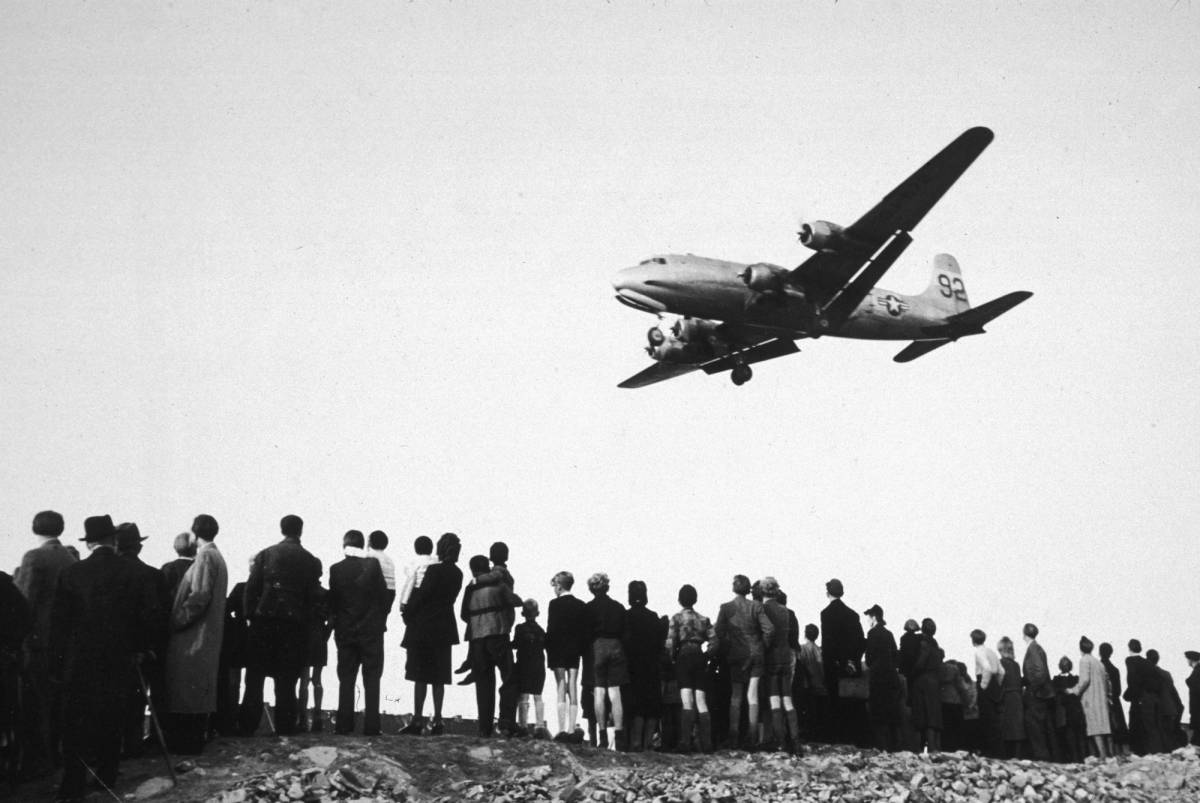Can America Keep Failing Upward?
American bumbling has paradoxically promoted the long-standing U.S. policy goals of greater German and Japanese military engagement. But we should be careful what we wish for.



It’s a paradox of strategy that some goals are more easily achieved through weakness than through strength. In theory, for example, Germany and Japan should have been most amenable to American demands for “burden sharing” when their confidence in U.S. leadership was greatest. In reality, the stronger, wiser, and more competent the United States appeared, the less reason Berlin and Tokyo ever had to put their shoulders to the wheel. Fifty years of Cold War consensus in Washington couldn’t convince Germany and Japan to assume more of the risks and costs of security and defense; after two decades of George W. Bush, Barack Obama, Donald Trump, and Joe Biden, it seems they’ve seen enough.
Not that the two U.S. allies are moving in identical directions. The Japanese government’s recent release of a National Security Strategy, National Defense Strategy, and Defense Buildup Plan is meant to expand Japan’s military capabilities specifically in order to serve as a force multiplier for U.S. military power in the Pacific. The German Chancellery, by contrast, reluctantly agreed to send Ukraine a single company of battle tanks only after weeks of pressure from NATO allies and its own coalition partners. While there is no doubt which side of the U.S.-China rivalry Japan is on, suspicions linger that the reestablishment of relations with Russia remains a top German priority.
Nevertheless, in the last few months alone—and under the leadership of its most pro-Russian major political party—Germany has announced the purchase of dozens of F-35 fighter jets, a European air defense initiative to combat the Russian missile threat in Kaliningrad, and the lifting of its objections to the killing of Russian soldiers in Ukraine with German-made tanks. Meanwhile, Japan will acquire hundreds of long-range precision strike missiles and possibly double its defense spending. All this suggests, among other things, that the United States can afford the reputation for decline it has earned by failing to deter a Taliban restoration in Afghanistan, Russia’s invasion of Ukraine, and China’s massive military buildup in the Pacific. Such is life, it seems, as the world’s only hyperpower: If our foreign policy is successful, we achieve our goals; if it fails, our allies step in—however grudging and incrementally—to do the work for us. Heads we win, tails our enemies lose.
If only it were so simple. A world in which Germany and Japan are vigorous but somewhat unpredictable strategic actors might still be preferable to one in which they remain in positions of perpetual dependency, as Americans have been advocating for decades. But under current circumstances, the specter of Germany and Japan wielding more independent diplomatic and military power than at any time in living memory could create more problems than it solves.
For all its clear net benefits, for example, a Japan that plays a more active military role may complicate relations with South Korea even as it drives North Korea and China closer together—and imposes risks and expenses that Japanese voters are not used to bearing. A Germany that openly prefers to fence-sit between NATO and Russia—providing conventional weapons to Ukraine while seeking to forestall a Ukrainian victory and salvage relations with Russia—also risks destabilizing a domestic political system that requires a certain degree of unity and a diplomatic position based on coordination with allies.
These dynamics will present the United States with at least two big challenges. First, they will require more aggressive and intelligent alliance management than the United States is capable of providing at the moment. Without a predictably strong, steady America in the picture—which the volatility of contemporary U.S. domestic politics makes it all but impossible to guarantee—Germany and Japan will be more likely to convey a sense of distress and unease that might alarm their neighbors and disturb their own long-standing traditions of consensus, caution, and cohesion.
Second, and perhaps more importantly as far as ordinary Americans are concerned, the reality of a more independent Japan and Germany is also likely to reverberate in larger ways at home. We may in fact wake up to a world in which yet another element of our national identity—indeed, one of our great communal origin stories—comes undone.

For 75 years, the peace, prosperity, and political sanity of Germany and Japan have served as testimony that America’s pursuit of its interests as a global superpower is, on balance, also in the best interests of most people in the world’s key strategic theaters. The astonishing postwar success of Germany and Japan have likewise allowed Americans to believe that their blunders in places like Korea, Vietnam, Chile, Somalia, Afghanistan, Iraq, Libya, and Syria are exceptions to the rule that the United States—despite its many flaws—is ultimately a force for progress.
Americans are used to thinking of World War II and the Cold War as two “founding moments” in the formation of our national self-image. But we tend to underrate how much of that identity depends more narrowly on the evidence provided by postwar Germany and Japan.
It’s a truism that Americans’ credal faith in their missionary destiny is as old as the Puritans. It’s also true that for the first 170 years of American history, our ideas about democracy, capitalism, and liberty didn’t quite catch on in the rest of the world the way we’d hoped. For most of the 19th century, the story in Europe and Latin America was one of failed revolutions. To the extent that American ideas spread in the East, they did so only through territorial acquisitions, annexations, and occupations that were difficult to distinguish from classic imperialism. In the early 20th century, military victory in World War I and diplomatic predominance at the postwar peace and disarmament conferences quickly gave way to the Great Depression, the rise of communism and fascism, and the downfall of the League of Nations.
Victory in World War II was a victory for civilization over barbarism, but it was hardly a victory for American notions of democracy or liberalism per se; Stalin was just as much a victor as FDR and Truman were. The unconditional surrenders of Germany and Japan, moreover, were compelled by a policy of violence maximization incompatible with more traditional ideas of human progress: Strategic bombing campaigns in 1945 killed approximately 400,000 German civilians and wounded 800,000 more; in the last five months of the war, American bombing raids killed nearly 1 million Japanese civilians—in addition to the 130,000-225,000 people killed in nuclear strikes against the cities of Hiroshima and Nagasaki.
Triumph in World War II was, in other words, not what Cotton Mather or Thomas Paine or John O’Sullivan or Woodrow Wilson had in mind when they saw America sharing the blessings of self-government, market economics, and individual freedom with the mass of mankind. It was the triumph of American economic and military supremacy amid the ashes of the Enlightenment.
Even during the early years of occupation, there was only a faint hint of America’s ancestral mission at work in the world. The U.S. occupation authorities in both Germany and Japan were, by necessity, military dictatorships that ruled by fiat and by retaining many of the war criminals who staffed the Nazi German and Imperial Japanese bureaucracies. Under the banners of democracy and free expression, they censored dissent and most public attempts to grapple with the nightmare through which the world had just passed. Japan endured the additional severities of American racial hatreds.
The eventual price of partial sovereignty for the two occupied countries included incorporation into the U.S. defense perimeter, the exclusion of leftists from political power, and at least the appearance of support for American geopolitical and ideological goals vis-à-vis the Soviet Union. But as long as Germany and Japan accepted America’s preferred security arrangements and made efforts to appear democratic and capitalist in ways Americans could recognize, they were both free by the mid-1950s to achieve internal peace and stability more or less how they pleased. By the same token, as long as the United States absolved Germany and Japan of responsibility for defense and security, it was free to imagine that the occupation period was really an exercise in fulfilling its credal mission.
America’s preferred version of events still contains plenty of myth, but in the end, there is no denying the fundamental truths at its core. The United States really did use unparalleled military force, economic might, and political capital to underpin democratic and societal transformations in Germany and Japan that quickly made hundreds of millions of people safer, richer, and happier. The wise introduction of economic aid, new currencies, and land and fiscal reforms didn’t just save Germany and Japan from economic collapse, but helped them rapidly become two of the wealthiest and most admirably humane societies in history. In Germany and Japan, the United States demonstrated that values like international cooperation, rule of law, economic liberalism, democratic governance, and peace are—in some deeply human way—transferable.
The scale of this accomplishment, and its importance to world history, reinforced the idea of the occupations as the acme of America’s benevolent work in the world. In his war speeches, George W. Bush repeatedly drew on the American experience in Germany and Japan to explain and build support for the U.S. invasion and occupation of Iraq.
The need to cling to Germany and Japan as evidence of America’s benign imprint on the world has only grown more intense as earlier patterns of disappointment have reemerged in the two decades since Osama bin Laden’s strategically calculated attacks on 9/11. The U.S. democracy agenda has failed from Afghanistan to China, and democracy is “backsliding” from Turkey to India. The United Nations is irrelevant or worse. Free trade has come into disrepute, and U.S. support for the Bretton Woods institutions it created is flagging. The threat of great-power war and possibly nuclear conflict loom larger than they have in decades.
In a word, the distinctive products of America’s missionary purpose are getting harder to come by, and the possibility that the Pax Americana represented a brief moment in time—rather than a new epoch in human history—seems more plausible than it did 25 or even 15 years ago. If Germany and Japan emerge from the coming era of trouble differently from how we’ve known them, it would only be natural. For Americans, however, the loosening of the bonds that tie us to our defeated enemies-turned-allies will make it harder to define our relationships with the rest of the world, or to recognize ourselves in the mirror they provide.
Jeremy Stern is deputy editor of Tablet Magazine.